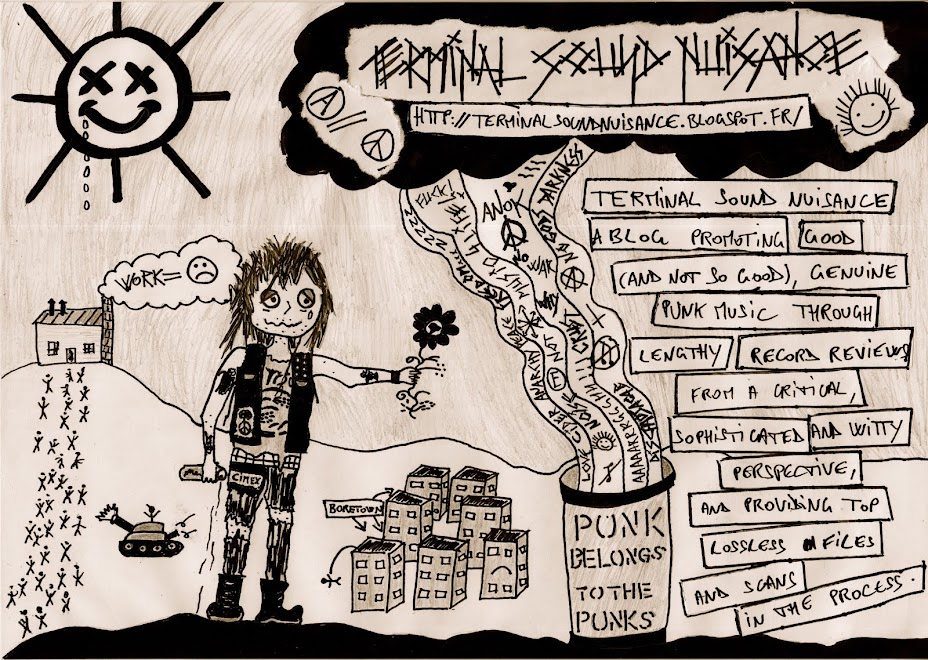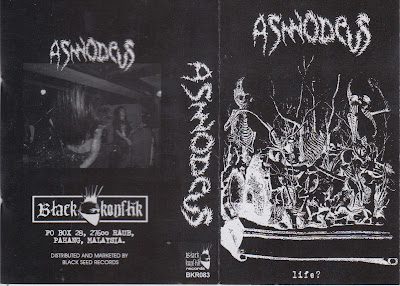After a well-deserved break that coincided with yours truly finding a part-time job (sigh), let's get Terminal Sound Nuisance going again.
This new series is guaranteed crust-free. Not that I have suddenly taken a dislike to the genre though. At this point in my life there's no going back from it and I leave the odious crime of crust betrayal to posers, scene tourists and modern post-hardcore enthusiasts. But after 23 posts dealing with crust music, I understandably need to think about something more tuneful than the usual cavemen choir, something that Time itself (yes, with a capital "T") has validated, something that makes my heart beat like a spotty teenager with a crush on his PE teacher (it is Physical Education, not Profane Existence, though they are not mutually exclusive I suppose): British anarchopunk from the eighties. In order to make things more challenging for me (as the famous French saying goes: "why should you make it easy when you can make it difficult?"), I decided to pick ten records, each of them corresponding to one of the ten successive years that made up the decade. There is no profound reason for this other than it provides me with a fun frame to work with. I guess my definition of "fun" is a bit twisted but there you go.
The first entry will be about a record that was first released in 1980, on April fools' day to be accurate, the irony of which, judging from the overall sloppiness of the work, is not lost on me: Six Minute War's first Ep. There is not that much information about the band's story but here is what I managed to dig out. There were actually four different versions of this Ep. Apparently, the original pressing was the one with the WWI soldier on the cover but I do not know when exactly my copy was released compared to the other versions (I don't think any of them saw the light of day after 1981 but I could be wrong). Anyway, the record was either successful enough to warrant subsequent rereleases or they were such small pressings that the band had to make new ones. I would venture that the truth lies somewhere in the middle. Because SMW were such a devout DIY band, I suppose they could not afford large pressings to begin with, but then, their music was also unique enough to garner meaningful attention form the punk-buying public. The title of the Ep is technically 75p which is a bit of a shit name, though it does not fail to point out a crucial selling argument, namely the cheap price (if you look at the cover, it even says "Only 75p" at the bottom, in case the unbeatable price escaped you the first time). The first pressing also indicated the actual length of the record ("14 minute EP") which is another top selling point for punks, but the band apparently thought that it was too reminiscent of value-for-money grocery talk and they switched to the "33.3RPM" notice on later versions (it still gives you a good idea about how good a deal it is though).
Hailing from Raynes Park in London and cheekily called after the infamous Six-Day War, Six Minute War are possibly the most staunchly DIY punk band I am aware of from the early 80's. The cut'n'paste cover is just a folded xeroxed A4 sheet and, if you look very closely, you can notice that the white labels are in fact not blank but that they intriguingly look like labels from another record that were reused on Six Minute War's! You can still make out some words from the original record they may have belonged to: Hazel O'Connor with the song "White room". Now, I have no idea who Hazel O'Connor is (is my ignorance for the best?) but I like to think the SMW boys, in a genuine act of proletarian autonomy, nicked her records from a chain store so as to use bits of them for their own. Punk is assuredly a romantic endeavour.
The band kept this radical and minimal DIY spirit for their two next Ep's, the poetically-named More short songs and Slightly longer songs Ep's which demonstrated a certain sense of humour and some funny literalism. In terms of musical content, Six Minute War were as DIY, minimalistic, amateurish and uncompromising as they looked. 75p contained no less than eleven songs, some of them less than a minute long, which was clearly a rarity in 1980 (even Discharge didn't have songs as short and Peni's first Ep only came out the following year). The rather original format (almost proto hardcore) of SMW's songs was completely relevant to their very direct, angry punk music however. Keeping in mind that it was recorded at a transitional time between the two major British punk waves, you could say that the music was not unlike an angrier, more primitive, more straight-forward version of 77 punk-rock that, to some extent, prefigured the second wave of punk-rock (be it of the UK82 or anarcho variety). Simply put, describing Six Minute War as a gloriously sloppy blend of Crass and Crisis with a hearty spoonful of The Epileptics and Wire (turned raw) is actually not far-fetched. You have got the typical energetic crassy tribal drumming as well as mid-paced, darkly catchy songs with vocals ranging from deliciously snotty, protest punk shouts to sterner spoken tones reminiscent of the crisisy elocution.
Despite obvious limitations in terms of production and musicianship, 75p had something that so many other punk-rock records lacked: an aggressive tunefulness. The riffs are very simple, the sound trebly and the song structures very basic, we are in the "minimal snot-punk" category here. But it works. It just does. The contagious passion, the spontaneity, the bursting urgency permeating the songs are unstoppable, the guitar sound is cheap - almost out of tune - but perfectly fits precisely because it reflects what the band's statement is all about. In fact, this Ep probably has some of the best two-chord punk songs ever written. For all the thinness and the instability (one can definitely picture the boys struggling on their instrument), the sincerity that the band conveys, visually, sonically and politically and their undeniably great ear for good, simple, catchy but aggressive tunes make Six Minute War stand out.
Perhaps ironically considering the templates of this series, SMW were not exactly an "anarchopunk" band. Or, perhaps more accurately, they were a non-anarchist anarchopunk band. They wrote songs (like the fantastically catchy "Camera" on 75p) that openly questioned and challenged the vision of a peaceful stateless society promoted by Crass that they judged middle-class and unlikely to come true because of our nasty tendencies and even made fun of the pseudo-revolutionary teens that followed and imitated Crass ("Marker pens"). Instead, they believed in social disorder to express and reach personal freedom. However, like Crass, they radically embraced the DIY ethics (more than a lot of anarcho bands of the time to be fair) and played with bands like Flux of Pink Indians, The Sinyx, Anthrax or Hagar The Womb. Similarly, their lyrics were clearly of a political nature, with songs about attacking the capitalist system through strikes, the danger of nuclear power, animal rights, the justice system, the idea of progress or social conformity. SMW's words are, like the music and visuals, of a direct nature, written from the working-class perspective of a youth and with some biting sarcasm.
Following 75p, Six Minute War self-released (as they always did) their second Ep, More short songs, a slightly better produced, heavier effort that was not quite as catchy but still contained the absolute hit "Sell out" about the first wave of punk bands and the genuinely hilarious song "Guitarist" about their guitarist completely losing it during the session (you can even hear the banter). Punk, innit? The next Ep, Slightly longer songs, saw the band toy with postpunk unconvincingly and they split right after. Some members (rumoured to be the most musically proficient) joined bands like 400 Blows and Concrete, but Rob and Charlie formed the brilliant Fallout and switched back to their brand of sloppy but tuneful, intense punk-rock. Still with a foot firmly rooted in the anarchopunk scene, despite not being technically an "anarcho band", Fallout released two magnificent Ep's and two solid albums of angry, abrasive UK punk music with postpunk ovetones that sound like the logical evolution to Six Minute War, more polished and diverse but with the same minimal vibe, DIY statement, social anger and aggressive tunefulness. Quite amazingly, there has never been a Fallout discography and at a time when reissues flourish like never before, it is definitely a mysterious oddity... Are we really growing that tasteless?
Thanks to Hazel O'Connor











